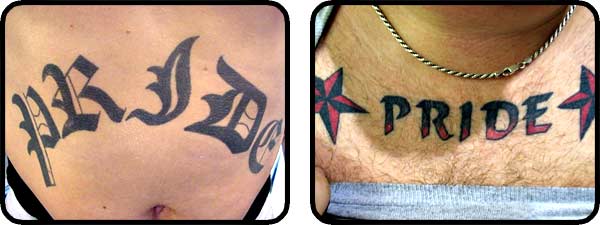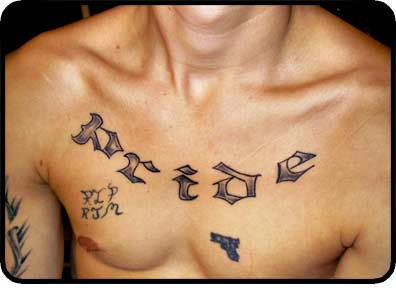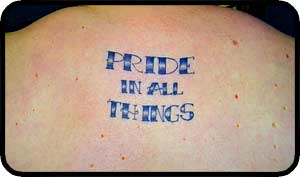 Proud to be tattooed? What’s there to be proud of? |
Well, you walk into a restaurantStrung out from the road And you feel the eyes upon you As you’re shaking off the cold You pretend it doesn’t bother you But you just want to explode Most times you can’t hear ’em talk Other times you canOh, the same old clichés “Is that a woman or a man?” And you always seem outnumbered You don’t dare make a stand – Bob Segar, Turn The Page
|
Being a modified person in an unmodified world can really suck, and genuinely brings truth to the expression “life’s not fair.” Most people think we’re a bunch of losers, and few of us work to change that perception.But still, I hear a lot of tattooed people (for the sake of simplicity, when I say “tattooed” in this article, take it to include people with any public mods that visually set them apart from the mundanes) say that they’re “proud to be tattooed”, or they’re proud to be a part of the tattooed community. Common slogans seen on t-shirts sold at tattoo conventions such as “the only difference between people with tattoos and people without is that tattooed people don’t care if you’re tattooed or not” imply not only an us-and-them stance, but the idea that we the modified are somehow “better”. The pages of my editorials here clearly have the same bias.

But what does it mean to have “modified pride” or to be “proud of your tattoos”? I often hear this coming from people with badly done tattoos that show minimal creativity or skill, and from people who do little to excel in life, thereby strengthening these stereotypes the mundanes already have about us. Pride (like respect) can be earned through achievement and dignity, or it can be seized with conceit as empty pride. When you hear someone say that they’re proud to be tattooed, what are they saying, and what exactly are they proud of? Do they have beautiful tattoos? Have they been successful as a tattooed person? Are tattooed people generally an over-achieving lot? Are we “the winning team”? Or are we no better than ignorant unemployed racists proud of our meaningless skin color?
The stereotype of a tattooed person is that of criminals, drug addicts, and chronic underachievers, and there is a statistical truth to that slander. Sadly, when it comes to people who choose to show those tattoos on public skin, the stereotype is often all too true. Not much to be proud of. That’s no surprise though — tattooed people are treated poorly by the majority; those who are not tattooed. The job market is much more difficult, we have to work harder for the same wages, we get poor customer service, we are shunned in mixed social groups, and are effectively a self-made minority and are treated as such. This stereotype remains because too many people with public tattoos and other mods continue to foster it — although we do plenty of whining about it, as if that could somehow change it. To make matters worse, too few who can shatter the stereotype stand behind their tattoos in the real world, choosing instead to hide them more with every promotion, thus reinforcing and giving a stamp of approval (or at least silent concession) to every prejudice they’ve faced themselves.
“If we were to wake up some morning and find that everyone was the same race, creed and color, we would find some other cause for prejudice by noon.”– George Aiken
Let’s be honest for a moment about what happens to most people when they get their hands or faces tattooed or pierced, or otherwise set themselves up visually as an outsider. If you do this, you will be harassed in public. People will make fun of you, and it will be the same insults and rude questions every day for the rest of your life. People will try and hurt you just for having chosen to look different than them. You will get poor service at restaurants, banks, and just about everywhere else. You will be turned down for jobs that you are more than qualified for. You will be turned down for loans that you have the credit rating for. If you work in the modification industry, governments will pass laws against your livelihood. If you have children, it will be harder to get them into a good school, and their teachers and other parents will abuse them because they don’t like the way you look. You and your family will have to work twice as hard and be twice as skilled to get the same amount of pay as people who fit the ignorant, ugly, mundane mold of the mainstream.
But these chosen hardships can be a foundation for strength — as Nietzsche put it (and he was far from the first or the last to say so), “that which does not kill me makes me stronger”. In the beginning of the 1960s, to many people, the Soviet Union had a broad lead in the space race. Even though US engineers had far less experience than the Soviets, and were working with the aid of computers no more powerful than a desk calculator, John F. Kennedy proposed that by the end of the decade — only eight years later — Americans would be walking on the surface of the moon, an almost laughably impossible ambitious goal. On September 12th, 1962 at Rice University he explained,
“But why, some say, the moon? Why choose this as our goal? And they may well ask why climb the highest mountain? Why, 35 years ago, fly the Atlantic? Why does Rice play Texas?We choose to go to the moon. We choose to go to the moon in this decade and do the other things, not because they are easy, but because they are hard, because that goal will serve to organize and measure the best of our energies and skills, because that challenge is one that we are willing to accept, one we are unwilling to postpone, and one which we intend to win, and the others, too.”
America did achieve this incredible goal*, Americans are still the only people to have achieved it, and their peaceful domination of space went a long way to defining America as a nation that inspired people around the world to shoot for the moon in their own way.
|
|
||
| * |
and they did it with the aid of an eccentric and very heavily tattooed engineer – Erl van Aken – but that’s another story!
|
|
It was the facing of difficult tasks (Herculean challenges might be a better term) and overcoming them that let this greatness bloom, and as well, in our own lives we need to choose the difficult path if we want to be great individuals. Heroes are nothing without challenge. We’re already starting down such a path by choosing to be publicly different than everyone else. The problem is that too few of us are also working to succeed. We’ve ridden off to war, but forgotten our swords at home, dull and rusty (luckily our opponents did as well). Hardship in and of itself does not bring greatness, but besting it can. These hardships of being publicly modified can be turned into successes. By facing challenges, we both avoid stagnation and allow ourselves to reach our potential.

The biggest problem in this world is the unholy trinity of stupidity, laziness, and lack of critical thinking. It’s why the biggest, richest governments in the world, made up of multi-millionaire politicians, can continue to trick their impoverished masses into electing them over and over. The masses have spent the last hundred years being conditioned toward ignorance in order to allow them to be controlled (see my previous column on this subject) — which is why modern elections are popularity contests in which fact-free advertising determines the winner and actual debates on the core issues are rare, let alone voters going out and educating themselves independently. Movies and television sell as fact pop science devoid in reality, and movies like the upcoming King Arthur are called “true stories” and “historical dramas”, fallacies that even the most basic of understanding should shatter… but rarely does.
Seeing this, I’m hardly proud to be a human, if I’m to define myself by the actions of these masses. Luckily, I don’t, and if you’re reading this you probably don’t either. I’ve decided instead that the masses haven’t earned the right to call themselves humans. In their failure I see a playing field optimized for success for those who don’t fall prey to the pitfalls of the easy life of the modern wageslave. The modified have already broken one bond of the mainstream — but only one of many — by crossing that social line. While “safe” tattoos grow in popularity every day, we still have a long way to go before the average person can tattoo their face — and I am not at all convinced that the average drone will ever even want to do something like that…
So how can you succeed when you wear public marks that set you up to fail?
“Just as iron rusts from disuse, even so does inaction spoil the intellect.”– Leonardo Da Vinci
The answer is simple and found in old-fashioned common sense: work hard and educate yourself. If modified people need to be better than the mundanes just to get the same recognition, we should take it a step farther. Be the best. Win everything. No compromises. That’s really all there is to it. If you’re in school, work hard and get good grades. Excellent grades. If you need help, ask for a tutor, and instead of watching four hours of TV, study and read. Have fun doing it; learn to enjoy it. Go out and exercise. Get fit and build up every skill you possibly can. Learn to weld. Plant a garden. Take Judo. Anything. And do it as a proud tattooed person, and stand up for yourself when you’re challenged.
Take it a step farther and support other modified people who are willing to work hard as well. Seek them out if you’re in a position to hire people, and if you’re in a position to be hired, be so damn good at your job that no one can complain about the fact that you have customized yourself into a more ideal human, and are who you want to be. Be proud, but make sure you can back it up with something worth being proud of. Go out and actively change the world for the better.
If we all work hard to be successful and to break the preconceived notions people have about us, we can change the stereotypes. Maybe we can go even farther, and create a new stereotype. We need to wear our tattoos as war paint for victory, not as the brands of criminals and losers. But don’t forget Kennedy’s words — choose this path willingly because it is hard, not because it is easy. And it will be hard, and it will take a long time before you can reap the rewards of this adventure, but you have already won the first battle by choosing to break the bonds of conformity and becoming publicly modified. You can win the war as well.

Shannon Larratt
BME.com

Free Online Resources
Since one of the ways the mainstream seeks to quash uprisings by those outside both the mundane and outside their elite control castes is financial pressure, you may be saying to yourself “but I can’t afford to even buy books to read.” You may already read the science blogs online and have discovered that they, like television, leave you with nothing but a shallow comprehension of a broad array of subjects, but without any real depth — sure it’ll help you win at Trivial Pursuit, but what good is shallow knowledge if you’re trying to genuinely understand a subject?
One of my favorite online “self improvement” sites that many people may have overlooked is Project Gutenberg (gutenberg.net). When the copyright on a book expires, Project Gutenberg works to make that book available to the public. Think of it as a free online library where you can read the classics — the books that over time we’ve decided were significant cultural contributions. It’s not going to be the same chuckle-factory as getting stoned and watching people making fun of oddballs on the WB Superstar, but are you looking for temporary amusement in life, or are you looking for knowledge, strength, and success?
And what’s stopping you from visiting your local library?
“Frederick Douglass taught that literacy is the path from slavery to freedom. There are many kinds of slavery and many kinds of freedom. But reading is still the path.”– Carl Sagan
 BME/News and Modblog highlight only a small fraction of what BME has to offer. Take our free tour and subscribe to BME for access to over 3 million body modification related photos, videos, and stories.
BME/News and Modblog highlight only a small fraction of what BME has to offer. Take our free tour and subscribe to BME for access to over 3 million body modification related photos, videos, and stories.